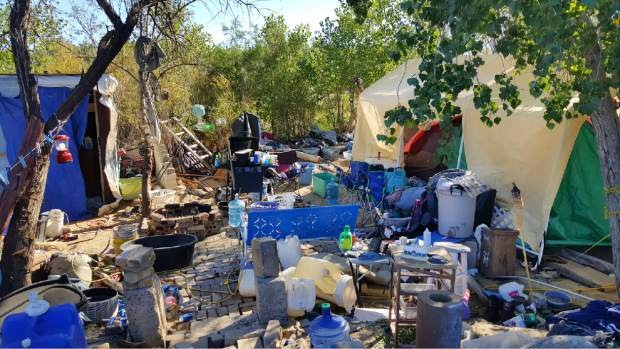60 Minutes Explores Pot in Pueblo
Colorado’s marijuana legalization has wreaked havoc on Pueblo, and city will be featured on 60 Minutes on November 6th. (Date has since been changed to Oct. 30) After nearly four years of legalized pot, many in the community are rebelling. By initiating Propositions 200 and 300, citizens of Pueblo hope to regain a voice in their future. A “yes” vote on both initiatives will shut down marijuana businesses in the city and Pueblo County.
Seventy percent of the counties in Colorado opted out of Amendment 64, which commercialized marijuana. The city of Pueblo banned retail marijuana, but the county of Pueblo licensed marijuana grows and retail stores. In 2014, we reported on the efforts to ban retail expansion in Pueblo West. Pueblo County commissioners promoted marijuana as an opportunity to fill empty factories and create jobs. Acting against the wishes of most of the county’s 160,000 residents, commissioners decided to license marijuana businesses..
Because of intense problems, business leaders now strongly favor Proposition 200 and Proposition 300. The Colorado Springs Gazette supports both propositions, because “new data show pot legalization as an insidious policy failure.” Citizens for a Healthy Pueblo has been fighting against the marijuana industry for two and half years. See the Citizens for a Healthy Pueblo Safety Fact Sheet.

An influx of 15,000 migrants moved to Pueblo for easy access to the drug. Some of the newcomers also hoped to find jobs in the pot industry. Tent villages are housing newcomers who can’t afford or find homes. Pueblo has always taken care of its homeless, but it can no longer handle the huge number of people needing services. Social services, soup kitchens and emergency rooms are stressed to the breaking point. Approximately one-third of county residents, 67,000 are on Medicaid.
Doctors from Three Hospitals Hold Press Conference
The medical community recently held a press conference, announcing that 237 physicians signed a statement supporting “yes” votes on the propositions. Physicians who spoke at the event detailed some of the health risks coming from marijuana use in the community. Dr. Steven Simerville, a pediatrician and Medical Director of St. Mary-Corwin Hospital, reports that 7-10% of the babies born are testing positive for THC. THC is the psychoactive compound in marijuana. Dr. Simerville cited a dramatic increase in attempted suicides, a five-fold increase since legalization. Every suicide attempt in the community, except one, involved THC.
Dr. Karen Randall an emergency medicine doctor affiliated with several of the Pueblo hospitals said that many of the newcomers to the area are coming to the emergency room with multiple and severe illnesses. Dr. Randall believes the Pueblo community could be on the verge of a public health disaster. She explained that those living in tent camps are at risk for the same communicable diseases found in refugee camps: flu, pertussis, cholera, tuberculosis. Randall, who previously worked in Detroit for a large city hospital as disaster coordinator, says she fears the Pueblo community health system is not equipped to deal with such an outbreak.
The black market is growing alongside the legal industry. Sheriff’s office reports that foreign cartels from Laos, Argentina, Cuba and Russia are now operating in Pueblo. The cartels are buying or renting homes and setting up illegal grows. Law enforcement has busted sixty illegal grows in 2016, but there are 1500 other documented grows –also illegal. Sheriff Kirk Taylor is also retooling his tracking methods to account for the increasing crimes associated with marijuana . Currently Pueblo has the highest murder rate in the state, at 11.1 per 100,000.
Rural Areas, Crime, Gangs and High Teen Use of All Drugs Reported
“Those living in the rural areas are scared,” reports Paula McPheeters of the Citizens for a Healthy Pueblo. “The marijuana grows are despoiling the land and draining the water aquifers. Squatters are growing marijuana and crime is increasing.” McPheeters says the community is being overwhelmed by outsiders moving in and taking over. Gang activity is increasing, drive by shootings, petty crime, auto theft are now big problems in a once peaceful community.
“Pueblo County now has 20 retail marijuana stores, compared to our 18 McDonalds, Starbucks and Walmart stores combined,” says McPheeters. The county took in 3.5 million in tax revenue from the marijuana industry, but McPheeters says, “The social costs to the community could easily be upwards of two times that amount.”
The biggest concern to those seeking to pass the ballot initiatives is the increase in youth drug use. Thirty one percent of high school students are using marijuana, three times the national average. Tragically, 12% have tried methamphetamine or heroin. The community has inadequate drug treatment facilities, so when teens get into trouble with addiction it is difficult to get them help.
A Cautionary Tale
Pueblo offers a cautionary tale against trying to resolve a government’s financial difficulties with tax revenue from marijuana. This relatively small city with a population of 120,000 is a former steel mill town which fell on hard times. It ranks number two in the state for poverty.
The Pueblo experience warns public officials to listen to the people’s will before allowing predatory businesses. It warns other communities what can happen to the youth when they’re surrounded by these businesses.
Pueblo may have some of the worst crime problems in Colorado, but it is not as bad as Eureka and Humboldt County, California. Humboldt County’s murder rate is 18.7 per 100,000 people, and it reports 250 missing persons per year.

